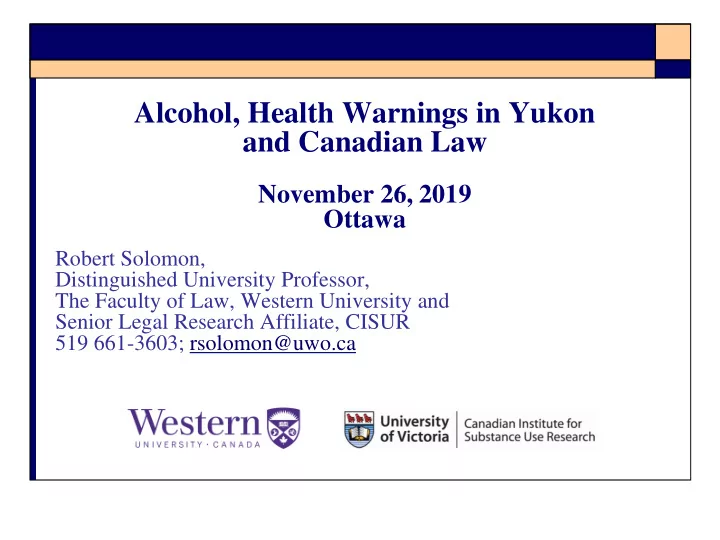

Alcohol, Health Warnings in Yukon and Canadian Law November 26, 2019 Ottawa Robert Solomon, Distinguished University Professor, The Faculty of Law, Western University and Senior Legal Research Affiliate, CISUR 519 661-3603; rsolomon@uwo.ca
Alcohol Industry Claim: Yukon had no constitutional authority to place health warnings on the alcohol products it sells. Canadian Law: The Yukon Act granted the Territory constitutional powers that were for the most part equal to those of the provinces. Thus, Yukon could enact stringent warning label legislation or undertake a warning label project under its constitutional authority over property and civil rights, public health, and matters of a local or private nature. Moreover, the Yukon Act gave the Territory express constitutional authority over “intoxicants.” It is ironic that the industry made this claim, given that Yukon has broader express constitutional authority regarding alcohol than Canada’s ten provinces. The alcohol industry’s claim has no legal merit. 1
Alcohol Industry Claim: The health warnings violated their freedom of expression under s. 2(b) of the Canadian Charter Rights and Freedoms. Canadian Law: Yukon attached to alcohol products that it had purchased from the industry a cancer warning from the Chief Medical Officer of Health. This is not a case of compelled or forced speech. In this situation, there is no apparent violation of the manufacturers’ freedom of expression. Had Yukon required manufacturers to attach health warnings and graphic images to their products, the manufacturers’ freedom of expression would have been infringed. However, the rights and freedoms in the Charter are not absolute, but rather may be limited pursuant to s. 1, when doing so is demonstrably justifiable in the circumstances. Thus, the alcohol manufacturers would have no Charter remedy if Yukon could establish that the mandated health warnings constituted a reasonable limit “prescribed by law as can be demonstrably justified in a free and democratic society.” 2
While commercial speech is protected under s. 2(b), it is viewed as less important than political or other types of expression. For example, the SCC unanimously held that a federal ban on almost all tobacco advertising and sponsorship, and a requirement for prominent health warnings and rotating, full colour, graphic images covering at least 50% of the main display surfaces constituted reasonable and justifiable limits on the tobacco companies’ freedom of expression. 3
Alcohol Industry Claim: Yukon can be held civilly liable in defamation for claiming that alcohol use can cause cancer. Canadian Law: Defamation protects the reputation of individuals, corporations and businesses, not products. It is injurious falsehood (slander of goods) that protects products. To establish injurious falsehood, the industry must prove on the balance of probability that: the statement is factually untrue, namely that alcohol use cannot cause cancer; and the statement was made maliciously, namely knowing it to be false or for some improper purpose. The claim would clearly fail on both grounds. The industry’s belief that alcohol is not carcinogenic or that there are more effective ways of informing the public is irrelevant. 4
Conclusions and Implications The industry has unintentionally raised a critical issue for the territories or provinces that have public sector alcohol outlets. All Canadian manufacturers and suppliers have a duty to inform consumers of the risks inherent in the foreseeable use and misuse of their products. They must inform consumers of risks of which they know or ought to know, and must keep abreast of the research in their field. The courts have established that the standard of disclosure: is stringent for products intended for human consumption; increases with the probability and severity of the risks; increases for products that are mass-marketed to potentially vulnerable consumers; and increases for any risks that are not generally known to the public. As an alcohol supplier, Yukon will be expected to meet a rigorous standard of disclosure, given the probability and severity of the cancer and other risks of alcohol use. 5
Ironically, removing the cancer warnings from their alcohol products exposed Yukon to a far greater risk of being held civilly liable than attaching them. The successful $15 billion Québec class action suit against three tobacco companies should encourage all alcohol manufacturers and suppliers to carefully re-assess their potential liability. It is only a matter of time before similar suits are brought against alcohol manufacturers and the provincial and territorial liquor authorities that sell their products. 6
Recommend
More recommend